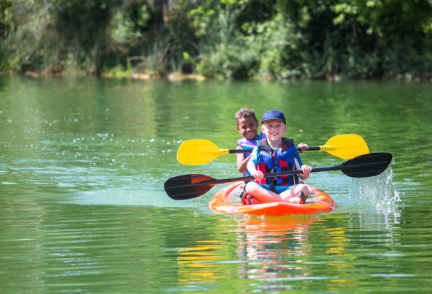School is coming to close, and that means students, and their parents are preparing for an annual right of passage, summer camp. Whether it is day camp or sleep away camp, there is a lot for parents to take into consideration for children to have a healthy and happy summer at camp.
Hackensack Meridian Children’s Health physicians are available for interviews on a variety of back to camp health topics, including the following:
Importance of Check Up Before Starting Camp: In the weeks before leaving for camp it is important to schedule a check up with your child’s pediatrician. This allows you and the doctor to ensure your child’s vaccinations are up to date, and discuss any potential health issues before going to camp.
Refilling medications and making asthma action plans: A check-up also allows parents to get refills on any medications including allergy or asthma medications that may be needed for camp. For asthmatic children it is important for the doctor to develop an asthma action plan of how to best control a child’s asthma, prevent flare ups and the best ways to respond to any breathing issues. Parents should make sure to organize a list of anything the camp needs to know about your child’s special needs such as food allergies or respiratory issues such as asthma.
Packing Sunscreen and teaching your child to reapply it – Sunscreen is vital protection against sunburn and long term sun damage. The American Academy of Pediatrics recommends that children wear sunscreen with an SPF of 15 or greater on any exposed areas of skin.The two main types of sunscreens you see lining the shelves use either chemicals or minerals to shield your skin. Chemical-based sunscreens use ingredients like oxybenzone or octinoxate, and these sunscreen choices protect from the sun by absorbing directly into the skin and then breaking down harmful UV rays. Typically easier to apply than their mineral-based counterparts, chemical-based sunscreens leave no visible residue.For full protection, they need to be applied about 10–30 minutes before sun exposure, and frequent reapplication may be necessary, especially after being in the water. Chemical sunscreens can cause an allergic reaction. Parents should test if the sunscreen causes a reaction before sending it to camp.
Pack Bug Spray to prevent diseases including Lyme – Mosquitos and ticks can carry diseases like lyme disease, west nile virus and others. It is important to wear bug spray and take actions to prevent bug bites. Do not use oil of lemon eucalyptus (OLE) or para-menthane diol on children younger than 3 years old, or apply insect repellent to a child’s hands, eyes, mouth, cuts or irritated skin. Adults should spray repellent onto their hands, then apply to a child’s face. Wear long sleeves and long pants when hiking in a heavily wooded area, and check your child for ticks when they return. If you do find a tick first, remove the tick with a pair of tweezers. Grasp the tick close to the skin and pull directly upwards until the tick comes free. After a tick bite, be on the look-out for signs of infection. The first sign of Lyme disease is usually a gradually enlarging, round or oval red discoloration of the skin surrounding the bite. Speak to your doctor about any symptoms your child develops, and mention the tick bite.
Mosquitoes are most abundant and active during the times when they can find a food source to feed on—typically in the pre-dawn and post-dusk hours of the day. When possible, avoid being outdoors during these peak times for mosquito activity.
Importance of a healthy diet & drinking enough water – Children should choose foods that will fuel them for the list of daily camp activities. Foods with a lot of sugar or simple carbohydrates will cause short bursts of energy followed by crash. Food packed with nutrients — with no or limited sugar, saturated fat, or salt added to it — is considered nutrient dense. Focusing on nutrient-dense foods helps kids get the nutrients they need while limiting overall calories.
Choose water instead of sugar-sweetened beverages. Substituting water for one 20-ounce sugar-sweetened soda will save your child (or you) about 240 calories. Sugar-sweetened beverages can include fruit drinks, sports drinks such as Gatorade and Powerade and non-diet soda. The amount of water a child needs depends on their age, weight and size, but generally children and teens should drink at least 6 to 8 (eight-ounce) cups of water a day, more on hot days when they are spending a lot of time outside.
Need for a good night’s rest – Sleep away camp and other summer activities may blur the lines of your child’s typical bedtime. It is important for children to get proper rest to recover from the day’s activities and prepare their body for the next day. Try to establish and maintain a set bedtime, so your child expects to go to sleep at the same time every night. Have a set wakeup time each morning, so your child is tired at bedtime. Put away smartphones and tablets an hour before bed, and keep devices out of the bedroom. A relaxing bedtime routine – bathing, reading and listening to music are good options to help your child prepare for bedtime. To aid sleep, keep your child’s bedroom cool and dark.
Covid and other infectious disease prevention – COVID taught us many things, including the importance of frequent and thorough hand washing. It can prevent illness, and not just COVID, but the myriad of health issues children can encounter when they are all together including stomach bugs, and other colds. Ask your camp organization about sleeping quarters. The American Camp Association advises kids sleep head to toe, so when, and if, they sneeze, they won’t sneeze on the other’s face.
One final tip for parents, be clear on your child’s camp emergency protocols and double check the staff have all necessary emergency contact information for you.
SOURCE; Hackensack Meridian Health








